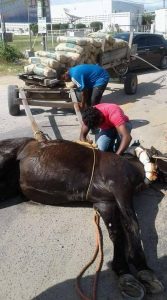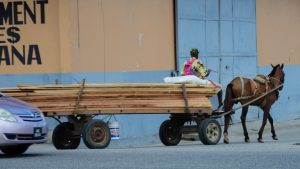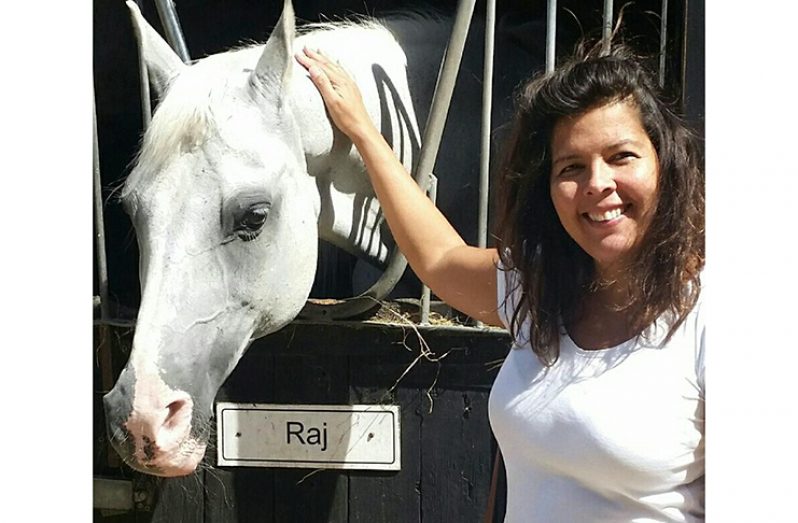THE merciless beating of horses and the overloading of horse-drawn carts are becoming a major concern for residents, authority bodies and animal welfare groups even as the Animal Welfare Bill is set to be enacted soon.
In the country’s capital city, among all forms of modern transportation, it is not uncommon for one to notice a handful of horse-drawn carts delivering lumber, cement and other items from one location to the next.
Those who utilise this means of transportation have done so for decades and long before there were paved roads or even a feasible alternative.
Take a trip to any lumber yard throughout the day and one would see horses stationed, awaiting the on loading of materials or simply tied to a post on standby by their owners.
However, while this practice serves as a means of employment and livelihood for some in society, many are concerned about the daily treatment meted out to those animals.
Over the years, animal activists groups as well as individuals such as Syaeda Manbodh have facilitated the treatment of abandoned and diseased horses left on the wayside.
On other occasions, the carcasses of those unfortunate animals have also been handled by the above mentioned.
Concerned with the way animals in general are treated in Guyana, the Government in July passed the Animal Welfare Bill 2016 which will reform animal welfare laws addressing the care and safety of animals.
The bill states that animals must have adequate food, care and space; should not be subject to torture, suffering or fear and should be provided adequate shelter from adverse weather and climatic conditions, among a list of other guidelines.
It also appoints fines up to 50,000 and imprisonment for up to three months to any person who abandons an animal, whether domestic, companion, wild or otherwise, kept under their control.
Although it is yet to take effect, this is good news for the Animal Welfare Activists of Guyana (AWAG) group which was launched in 2017 with aims of improving the lives of all animals while changing the mindset of those cruel to them.
Its founder, Shanti Mathews, told the Guyana Chronicle that she started the group after her personal encounter with a fatally injured horse just outside her mother’s house.
“This was the beginning of the seeds of change in me that I was so impacted that I felt that I’ve got to do something for horses and donkeys…all that I’m doing is to help all the animals, but especially horses and donkeys because they are totally neglected in Guyana and no organization is covering them,” Mathews said.
However, with levels of cruelty still prevalent in this regard, some in public through AWAG have begun to call for the practice of horse labour to be done away with altogether.
Matthews said that while this may certainly seem as a means for the ill-treatment to cease, such a solution is easier thought up than executed.
“Even if they say ‘just don’t bother with horses and donkeys anymore, just take them off the streets and just have the cars’, where are these animals going to go? There is no sanctuary in Guyana for horses and donkeys…so what would happen in that case is that their owners would abandon them to the streets of Guyana and they would get into accidents or they would take them to the slaughter house to be slaughtered and then they’d be no horses and donkeys,” she responded.
Before such a decision is made, Matthews believes that there must be a clear strategy to create horse and donkey sanctuaries, even as she suggests unused portions of farmlands as a possible option.
However, these are presently only suggestions as the issue of how the government will go about dealing with these concerns when the bill is enacted is yet to be publicly decided.
This must be done meticulously as, on the flipside, quite a few persons depend on horses for their livelihoods and removing this option could pose financial challenges to this bracket.
Speaking with a horse and cart owner working in collaboration with a particular lumber company in Georgetown, he told the Guyana Chronicle that such a change “would affect us…real cruel too.”
Currently, there are no regulations which oversee the registration of horses, but registration is conducted for horse carts which traverse the busy roadways similar to vehicles.
“You can go and buy a horse if you want. I do delivery,” the man concurred, adding that there is no other requirement, apart from branding for ownership, safe for: “You have to get cart licence from the GRA.”
Presenting to him an overview of the Animal Welfare Bill and what it could mean for animals in Guyana, he appeared concerned but was also willing to speak on the possible life span of one of the horses.

“It depends. You could work a horse today and it could fall down and dead today. They have horses that fall down with stoppage of water; horses are just like humans. But you have to take care of them, you have to feed them good, feed them what they’re supposed to get and a horse can last 10 years, 15 years, 20 years, 25 years,” he listed off.
The horse owner added that the care needed also includes proper feeding and vitamins with one bag of horse feed at a cost of $6000 being able to last for up three weeks.
He also added: “You have to buy corn, you got to buy oats, you got to buy barley, you got to buy tonic, you got to buy B-Complex and these medicine.”
Should the government move to do away with the age-old practice, the man asserted: “If they rule it out they got to give we money for us to buy a canter because I can’t afford it.”
He made the remarks as he compared that both a horse and cart averages at $300,000 while the cost for a vehicle would run somewhere in the millions.
Despite these uncertainties, Matthews wants to see the bill, when enacted, involving the participation of law enforcement which she believes is currently too easy-going on the issue.
“The police on their own is a big issue with their indifference. I’ve gotten lots of reports of police indifference to animal cruelty. It has happened right in front of them and they’re just standing there doing nothing. We need the Government to make the police step up and take it seriously,” she urged.
At the time, the Guyana Livestock Development Authority (GLDA) has been identified as the body in charge of administering the law.
Agriculture Health and Food Safety Specialist within the Ministry of Agriculture, Dr. Mark Pierre believes that despite the fact that a clear path has not yet been set, horses and horse carts will one day become a thing of the past.

“The horses will have to, eventually, be banned from off the road because the traffic is getting too much and the world is moving away from that,” he told this newspaper.
Other Caribbean countries have also down scaled or completely eliminated the use of such while some other countries utilise modern horse-drawn carts as carriages for tourist attraction.
However, until then, Pierre stated that plans are in the works for the welfare of horses and similar animals to be addressed.
“We have regulations planned for draft animals [horses and bullocks]…to be regulated to compliment the bill. The bill is just the general Act that gives you the general provision. The regulation gives you the details and one of the regulations would be for draft animals,” he said.
Also, to aid the Government in its decision-making process, an Animal Welfare Commission will be established.
It will comprise experts from the disciplines of veterinary medicine, human medicine, biology, pharmacy, biochemistry and agronomy, as well as representatives from animal protection associations.
It will be responsible for advising the Minister of Agriculture on current scientific and technical developments in the field of animal welfare and providing opinions on matters relating to animal protection.
The Commission will also submit annual reports on its work; establish its rules of procedure and issue opinions on proposals for legislation in the field of animal protection.




.jpg)









